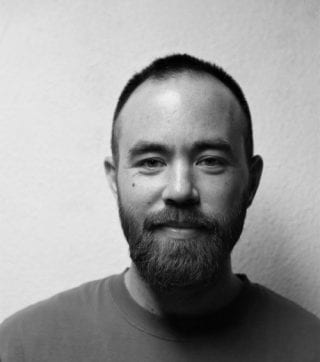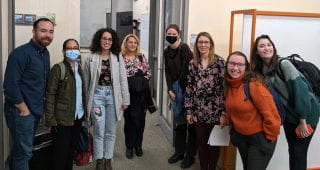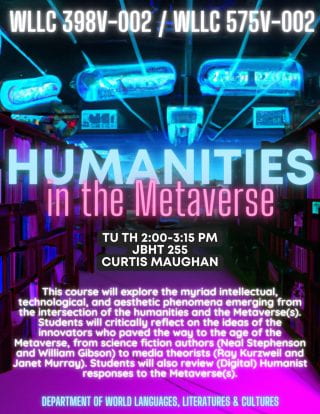A Q&A with World Languages and Digital Humanities’ Curtis Maughan

Curtis Maughan, Ph.D.
Director of the World Languages and Digital Humanities Studio in the Department of World Languages, Literatures and Cultures
In this conversation, Maughan talks about joining the college as its new director of the World Languages and Digital Humanities Studio; helping students explore new cultures through virtual reality; the intersection between language, technology, and digital game development; the importance of forging your own path; the doors opened by learning a foreign language; upcoming WLDH Studio events; and his new upcoming “Humanities in the Metaverse” course being offered this spring.
Q: Tell us about your new role in Fulbright College’s Department of World Languages, Literatures and Cultures. What excites you about this?
My role in the Fulbright College is Director of the World Languages and Digital Humanities (WLDH) Studio. Through events and research initiatives, the WLDH Studio explores the intersection of digital technology and the humanities, with special attention to the study of world cultures.

I’m very excited to be working with a diverse and talented team in the Department of World Languages, Literatures and Cultures, who are dedicated to innovative pedagogy and research, along with the meaningful integration of digital media and tools in the classroom.
While we’ve been exploring a range of digital technology at the studio, I’m especially interested in the immersive potential of VR environments, which can enable U of A students to explore cultures around the world from here on campus.
Q: What brought you to Fulbright College? What are you most looking forward to about your time here?
During my doctoral research in German studies, I had the opportunity to work at the Cologne Game Lab as a researcher and program manager. The intersection of humanities scholarship and digital game development not only shaped my dissertation, but it also demonstrated the vast potential of game studies and game development for the enrichment of the digital humanities.
The position of Director of the World Languages and Digital Humanities Studio speaks to my dual passion for language teaching and cutting-edge technology. Bringing a global perspective to the realm of technological innovation is both exciting and necessary.
I’m looking forward to working with colleagues who share these interests, like David Fredrick, whose work in game design as a mode of teaching and research has paved the way for a more creative and meaningful integration of the digital in the humanities. It’s an exciting time to be a part of Fulbright College!
Q: What do you most hope your students remember from their classes and/or interactions with you?
I hope they remember that they have a supportive community here in the Fulbright College and at the World Languages and Digital Humanities Studio. And I hope that they realize that their ideas, their research passions are valued by Fulbright faculty.
At the WLDH Studio, we give agency to our student community to shape the trajectory of the Digital Humanities at the U of A. For example, one of our weekly meetings–The VR Club for Language Learning–was founded by studio researcher Jhonatan Carmona.
Q: Now that you’ve established your career, what advice would you give to students who might be interested in following a similar path?
Explore the subjects that you find truly interesting. When I started my dissertation, I could not have imagined that I would be able to combine German studies with game studies and find a job at that intersection.
The most rewarding experiences are the ones you find on the pathways you forge yourself, not on the ones prescribed to you.
I also recommend learning a foreign language–it opens doors you didn’t even know existed.
Q: What do you like to do during your time outside of work?
I love going to the Fayetteville Public Library! It is an amazing community resource and I hope to collaborate with them down the line.
Q: What’s up next on the horizon for you?
 I’m really looking forward to the course I’m teaching in the spring, “Humanities in the Metaverse,” in which we will be exploring the ideas of an exciting range of thinkers, from Sci-Fi authors to media critics. We will also be building Metaverses of our own using VR software.
I’m really looking forward to the course I’m teaching in the spring, “Humanities in the Metaverse,” in which we will be exploring the ideas of an exciting range of thinkers, from Sci-Fi authors to media critics. We will also be building Metaverses of our own using VR software.
In anticipation of that spring course, the WLDH Studio is hosting a series of events with Cologne Game Lab founder Gundolf S. Freyermuth from Nov. 15 -17. He will give a talk on Nov 16 titled “Utopian Visions in the Future’s Modern History: From the Total Work of Art to the Metaverse.”
Q: Is there anything else you’d like to add or let readers know?
I am very excited about an event the WLDH Studio will be hosting on Wednesday, Dec.7–a grad student Holiday Maker’s Mart–where visitors can purchase student-made crafts and goods just in time for the holiday season.
On the one hand, I’m really impressed by the creativity and entrepreneurial spirit of the students who are driving this event. On the other hand, I’m frustrated and dismayed by the fact that our graduate students have to seek additional income streams because they are simply not paid enough.
Considering the formal and informal labor our graduate students provide, especially our language instructors who teach two courses a semester, it’s important that we provide them with appropriate compensation so that they can focus on their studies and teaching without having to worry about making rent.
Q: Do you have any social media handles or additional info you’d like us to include?
The U of A community can keep up to date on the WLDH Studio’s event schedule by adding the following handle to their Outlook Calendar: wldhs@uark.edu
And you can follow us on Instagram @uarkwldhs
Our fantastic assistant director, Cheyenne Roy, manages all WLDH Studio social media and communication!

